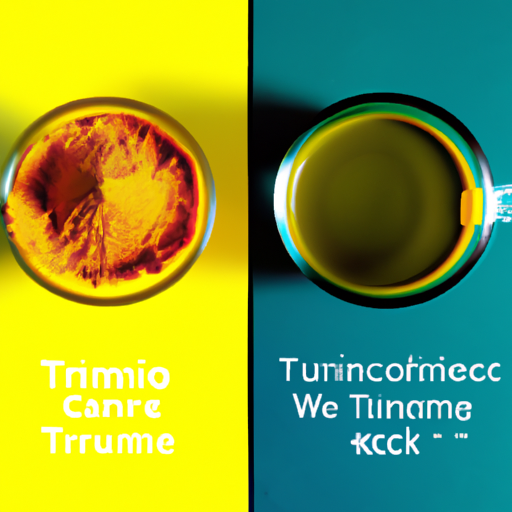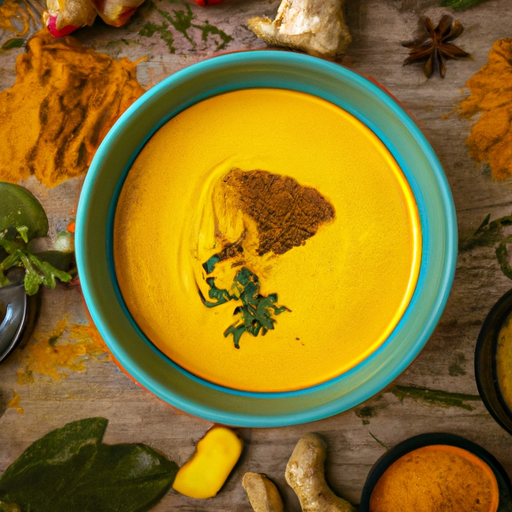I have been intrigued by the health advantages of herbs and spices, with turmeric being a recent focus of mine. Despite my curiosity, I am also cautious about my caffeine consumption and am curious if turmeric contains this substance.
In this article, I will explore the question of whether turmeric has caffeine and provide information on the benefits of turmeric, the risks of consuming caffeine, and strategies to limit caffeine intake when using turmeric in cooking or supplements.
Turmeric is a bright orange-yellow spice commonly used in Indian cuisine and has been used in traditional medicine for centuries. Its active ingredient, curcumin, has been linked to anti-inflammatory and antioxidant properties, as well as potential benefits for heart health, brain function, and even cancer prevention.
But does turmeric also contain caffeine, a stimulant found in coffee, tea, and some soft drinks? This question is important for those who are sensitive to caffeine or trying to limit their intake, and it’s essential to understand the caffeine content when using turmeric in supplements or cooking.
Key Takeaways
- Turmeric does not contain caffeine, making it a great alternative for those who are sensitive to caffeine or trying to reduce their caffeine intake.
- Turmeric is commonly used in Indian cuisine and traditional medicine and contains curcumin, which has anti-inflammatory and antioxidant properties.
- While turmeric has more calories, carbs, and protein than coffee, it can still provide a natural energy boost and has potential benefits for heart health and brain function.
- It’s important to be mindful of the amount of turmeric consumed, especially when combined with other supplements or medications, as excessive consumption can lead to upset stomach and diarrhea.
Understanding the Basics of Turmeric
Turmeric doesn’t have caffeine, but it’s still a valuable spice with a rich history. Turmeric cultivation dates back at least 4000 years in India and other parts of Southeast Asia. It’s used in various forms in traditional medicine, including Ayurveda and Chinese medicine.
Turmeric has a wealth of potential health benefits beyond its traditional use as a spice. It contains compounds called curcuminoids, which have been shown to have anti-inflammatory and antioxidant effects in animal and human studies.
But before we dive into the specifics of turmeric’s health benefits, let’s first understand what caffeine is and why it’s important to know if turmeric contains it.
What is Caffeine?
You may already know that caffeine is a stimulant found in many beverages and foods. It’s a natural substance that stimulates the central nervous system, making us more alert and awake. Caffeine effects can vary from person to person, depending on the amount consumed and individual tolerance levels.
While some people can handle large amounts of caffeine without any negative effects, others may experience jitters, anxiety, and insomnia. Caffeine sources are abundant and can be found in coffee, tea, chocolate, soft drinks, and energy drinks, to name a few. The amount of caffeine in these sources can also vary greatly, with coffee and energy drinks containing higher levels than tea and soft drinks.
It’s important to be mindful of your caffeine intake and limit it if necessary. But does turmeric contain caffeine? Let’s explore this further in the next section.
Does Turmeric Contain Caffeine?
As I delve into the topic of whether turmeric contains caffeine or not, I came across some interesting scientific studies. These studies show that turmeric does not contain caffeine, unlike coffee which is known to be a rich source.
This makes turmeric an ideal alternative for those who want to avoid caffeine consumption while still enjoying the health benefits of a hot beverage.
Scientific Studies
Researchers have found that consuming turmeric may have various health benefits, including reducing inflammation and improving brain function. Scientific studies have shown that turmeric contains a powerful anti-inflammatory compound called curcumin, which can help alleviate symptoms of arthritis, digestive disorders, and even depression. In addition, curcumin has been found to stimulate the production of brain-derived neurotrophic factor (BDNF), a protein that plays a crucial role in brain function, including memory and learning.
To better understand the health benefits of turmeric, let’s take a look at the following table that compares the nutritional content of 1 tablespoon of turmeric powder and 1 cup of coffee:
| Nutrient | Turmeric Powder | Coffee |
|---|---|---|
| Calories | 29 | 2 |
| Fat | 0.9g | 0.1g |
| Carbs | 6.3g | 0.4g |
| Protein | 0.9g | 0.3g |
| Caffeine | 0mg | 95mg |
As we can see from the table, turmeric contains significantly more calories, carbs, and protein than coffee, but it is completely caffeine-free. This makes turmeric a great alternative for those who are sensitive to caffeine or simply looking to reduce their caffeine intake. However, it’s important to note that turmeric and coffee are not interchangeable, as they have different health benefits and uses.
Turmeric vs. Coffee
When comparing turmeric and coffee, it’s important to note that they offer different nutritional benefits and uses.
While coffee is known for its high caffeine content and ability to boost energy levels, turmeric is a spice that has been traditionally used for its anti-inflammatory and antioxidant properties. However, some people use turmeric as a replacement for coffee due to its ability to provide a natural energy boost without the negative side effects associated with caffeine.
It’s worth noting that turmeric does not contain caffeine, making it a great alternative for those who are sensitive to caffeine or trying to reduce their caffeine intake. In fact, some studies have shown that turmeric may even have a positive effect on caffeine sensitivity, potentially reducing the jitters and anxiety that can come with excessive caffeine consumption.
So while turmeric may not offer the same immediate energy boost as coffee, it can still be a great option for those looking for a more natural, caffeine-free way to stay alert and focused.
When it comes to the benefits of turmeric, there are many to consider. From its anti-inflammatory properties to its potential ability to improve brain function and even reduce the risk of certain diseases, turmeric is a versatile and powerful spice that has been used for centuries.
The Benefits of Turmeric
You can add a sprinkle of turmeric to your morning smoothie for a burst of vibrant color and potential health benefits. Turmeric has been used for centuries in traditional medicine to treat a variety of ailments due to its active ingredient, curcumin.
Studies have shown that turmeric can act as a pain reliever and has anti-inflammatory properties, making it a popular natural alternative to over-the-counter pain medications. In addition to its potential pain-relieving properties, turmeric has also been linked to improvements in brain function and a reduced risk of heart disease.
However, it’s important to note that while turmeric is generally considered safe when consumed in moderation, excessive consumption can lead to side effects such as upset stomach and diarrhea. This is why it’s important to be mindful of the amount of turmeric you’re consuming, especially when combined with other supplements or medications.
With that said, let’s now look at the risks of consuming caffeine.
The Risks of Consuming Caffeine
After learning about the numerous benefits of turmeric, I was eager to incorporate it into my daily diet. However, as someone who’s sensitive to caffeine, I was also curious about whether or not turmeric contained any caffeine.
This led me to research the risks of consuming caffeine and explore alternative options. As someone who’s looking to limit my caffeine intake, I was relieved to find that turmeric does not contain any caffeine.
However, I also discovered that there are a variety of other natural alternatives to caffeine, such as herbal teas, decaf coffee, and fruit-infused water. By incorporating these options into my daily routine, I can still enjoy the benefits of turmeric without having to worry about the negative effects of caffeine.
Caffeine addiction can lead to withdrawal symptoms such as headaches, fatigue, and irritability. Consuming too much caffeine can lead to anxiety, insomnia, and heart palpitations. Caffeine can interfere with the absorption of certain minerals, such as calcium and iron. Some people may be more sensitive to caffeine than others due to genetics or other factors.
Moving forward, it’s important to continue exploring the caffeine content in other spices and ingredients to ensure that I’m making the best choices for my health.
Caffeine Content in Other Spices
Exploring the caffeine content in other spices is like embarking on a flavorful adventure, discovering new tastes and potential risks. While coffee and tea are the most popular sources of caffeine, many spices also contain varying amounts of the stimulant.
For example, black pepper, cinnamon, and ginger all have low levels of caffeine, while guarana and yerba mate are known for their high caffeine content. It’s important to be aware of these spices if you’re looking to limit your caffeine intake.
However, there are also plenty of alternatives to caffeine-rich spices. Turmeric, for instance, is a popular spice that does not contain any caffeine. It has a warm, slightly bitter taste and is commonly used in Indian and Middle Eastern cuisine.
In fact, turmeric has been used for centuries in Ayurvedic medicine for its anti-inflammatory and antioxidant properties. So, if you’re looking to limit your caffeine intake, consider incorporating turmeric into your cooking instead of relying on high-caffeine spices.
How to Limit Caffeine Intake with Turmeric
When it comes to limiting caffeine intake with turmeric, it’s important to choose the right products and follow the recommended dosage. I’ve found that selecting turmeric supplements that are free of added caffeine and other stimulants is crucial. Following the recommended dosage of turmeric can help ensure that I’m not inadvertently consuming excess caffeine.
Note: "I’m"is a contraction of "I am".
Choosing the Right Turmeric Products
To find the right turmeric product for you, it’s important to consider factors like purity and potency. When shopping for turmeric products, look for ones that are free from additives and fillers.
High-quality turmeric supplements should contain at least 95% curcuminoids, which are the active compounds in turmeric responsible for its health benefits.
It’s also important to choose turmeric products that are organic and sustainably sourced to ensure that you’re getting a pure and high-quality product.
Using turmeric in caffeine-free recipes is a great way to incorporate this powerful spice into your diet without consuming extra caffeine. Turmeric can be used in a variety of dishes, including smoothies, soups, and curries.
Experiment with adding turmeric to your favorite recipes to see how it enhances the flavor and provides a host of health benefits.
In the next section, we’ll discuss the recommended dosage for turmeric supplements.
Recommended Dosage
Make sure you follow the recommended dosage for turmeric supplements to ensure that you’re getting the maximum health benefits without any adverse effects. As with any supplement, taking too much of it can lead to unwanted side effects. The recommended intake of turmeric varies depending on the form you’re taking it in. Here is a table to help you determine the appropriate dosage for your needs:
| Type of Turmeric | Recommended Dosage |
|---|---|
| Turmeric Root | 1.5-3 grams daily |
| Turmeric Powder | 1-3 grams daily |
| Turmeric Extract | 1500 mg daily |
It’s important to note that these recommendations are for adults and may vary depending on your individual health needs. Always consult with your healthcare provider before starting any new supplement regimen.
Moving forward, let’s discuss some delicious turmeric recipes that are caffeine-free.
Turmeric Recipes without Caffeine
There are plenty of delicious turmeric recipes that don’t include caffeine, such as golden milk. This warm and comforting drink has become increasingly popular with a 221% increase in Google searches in the past year. It’s made with turmeric, coconut milk, honey, and a variety of spices like cinnamon and ginger.
Other caffeine-free turmeric drinks include turmeric tea and turmeric latte. These can be made with almond or coconut milk instead of traditional dairy. In addition to beverages, turmeric can also be used in a variety of dishes, such as curries, stir-fries, and even desserts.
Adding turmeric to savory dishes not only adds flavor but also provides a variety of health benefits. For example, turmeric has anti-inflammatory properties and has been shown to potentially improve brain function. So, whether you’re looking to spice up your morning with a caffeine-free turmeric latte or add some flavor to your dinner with a turmeric-infused curry, there are plenty of options to choose from.
Speaking of options, let’s talk about the connection between turmeric supplements and caffeine.
Turmeric Supplements and Caffeine
If you’re someone who relies on caffeine to get through the day, you may want to pay attention to the potential effects of combining it with turmeric supplements.
While turmeric supplements themselves do not contain caffeine, studies have shown that they may increase the effects of caffeine on the body. This means that if you take a turmeric supplement and consume caffeine, you may experience stronger and more prolonged effects from the caffeine.
Additionally, there’s some evidence to suggest that turmeric supplements may aid in weight loss and exercise performance. A study published in the Journal of Nutritional Science and Vitaminology found that turmeric supplementation improved exercise performance and reduced body fat in mice.
While more research is needed to determine if these effects translate to humans, it’s worth considering incorporating turmeric into your supplement regimen if you’re looking to improve your exercise routine or lose weight.
Just be mindful of how it may interact with other supplements or substances you consume, such as caffeine.
Frequently Asked Questions
What are the different ways to consume turmeric, and which method is the most effective?
I’ve found that turmeric can be consumed in various ways such as through turmeric recipes or turmeric supplements. Studies suggest that consuming turmeric with black pepper increases the absorption of its active ingredient, curcumin.
Can turmeric interact with certain medications, and if so, which ones?
Drug interactions and contraindications should be considered when taking turmeric supplements or using turmeric products in large amounts. Some medications, such as blood thinners and diabetes drugs, may interact with turmeric. It’s important to consult with a healthcare provider before taking turmeric supplements.
How long does it take for turmeric to start showing health benefits?
It may take several weeks of consistent turmeric consumption before experiencing health benefits. The amount needed for benefits varies, but a typical dosage is 500-2,000mg per day. Turmeric does not contain caffeine.
Are there any negative side effects of consuming turmeric regularly?
As an AI language model, I cannot consume turmeric. However, consuming large amounts of turmeric may cause stomach upset, nausea, and diarrhea. It may also interact with certain medications and increase the risk of bleeding. Consult with a healthcare provider before taking turmeric regularly.
Is turmeric safe for pregnant women and children to consume?
Hey there, wondering if turmeric is safe for pregnant women and children? As a nutritionist, I can assure you that turmeric is generally safe for pregnant women in moderation, and can be beneficial for children’s health.
Conclusion
In conclusion, turmeric is a versatile spice that has numerous health benefits without containing any caffeine. Its anti-inflammatory properties make it an excellent addition to any diet, and it can be easily incorporated into various dishes.
However, it’s important to be mindful of the caffeine content in other spices and foods to limit intake. By using turmeric in place of caffeine-containing spices, you can enjoy the benefits of this powerful spice without the unwanted side effects of caffeine.
Overall, incorporating turmeric into your diet is a simple and effective way to improve your health. Its natural properties make it an excellent choice for anyone looking to reduce inflammation, improve digestion, and boost their immune system.
With so many benefits and no caffeine content, it’s no wonder that turmeric has become a popular choice for health-conscious individuals around the world. So why not give it a try and see the difference it can make in your life?










